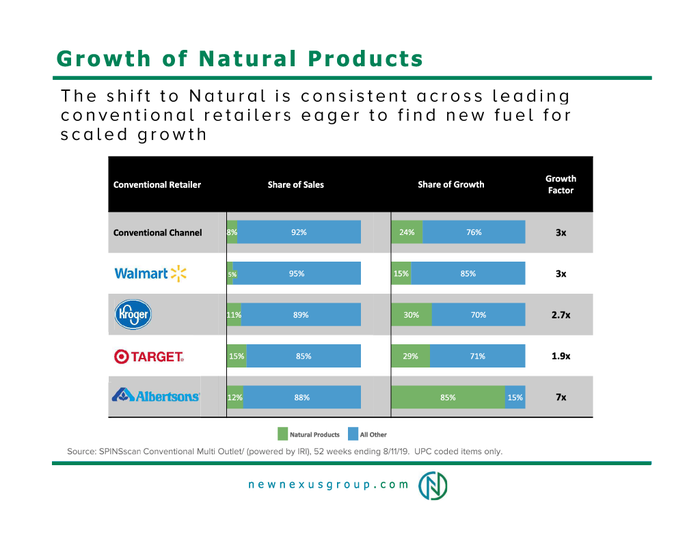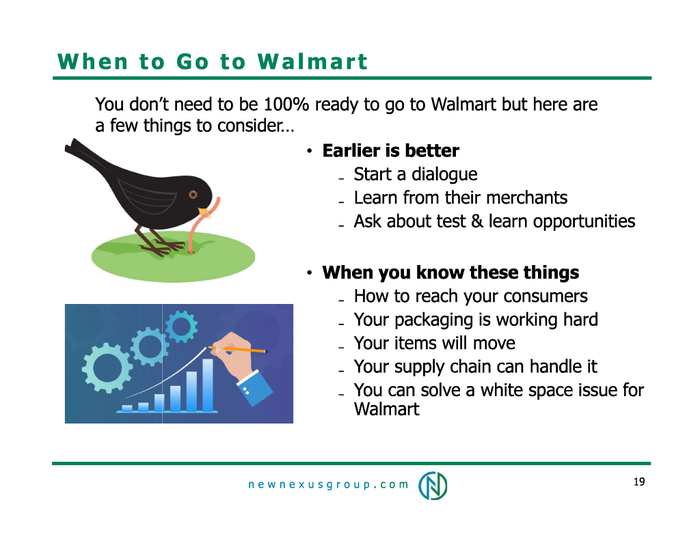Times have changed: How Walmart is becoming a valuable partner to good food brandsTimes have changed: How Walmart is becoming a valuable partner to good food brands
This piece is part of the Good Food Insights series—a collaboration with FamilyFarmed’s Good Food Accelerator and Naturally Chicago programs, Esca Bona, and SPINS—that unpacks the dynamics driving the good food movement.

Just a very short time ago, a story saying positive things about Walmart would have been an unlikely find on a news site focused on the natural products industry. Walmart had risen to its station as the nation’s No. 1 food retailer by selling conventional groceries at "everyday low prices" to masses of budget-conscious consumers.
Yet Walmart, like every smart retailer, recognizes the inescapable fact that consumers—not just affluent "foodies," but also people of average means who make up the core of Walmart’s customer base—were increasingly demanding better-for-you, better-for-the-planet products. So Walmart, already the nation’s largest seller of organic foods based on volume alone, has moved assertively to expand its assortment of good food consumer packaged goods.
That explains why Naturally Chicago’s most recent Insights event at SPINS was a master class for early stage entrepreneurs seeking shelf space at Walmart. The program was led by Tim O’Brien and Dei Miller of New Nexus Group—a broker located in Bentonville, Arkansas, near Walmart’s world headquarters—who had previously provided their Selling to Walmart seminar to Naturally Boulder.
They were joined on a panel by representatives of four companies that have had notable success at reaching Walmart consumers: Limitless, whose caffeinated sparkling water gained shelf space in all 4,400 Walmart stores almost overnight; Vital Proteins, whose collagen products have generated skyrocketing sales; YumEarth, which makes organic, dye-free candy; and Madhava Ltd., a 45-year-old company riding the wave of consumer interest in natural sweeteners.
Jim Slama, CEO of FamilyFarmed and co-founder of Naturally Chicago, said the idea for the session was spurred by visits with panelists Matt Matros, founder and CEO of Limitless, and Tracey Halama, Vital Proteins’ vice president of sales, in their Chicago offices. Both said they were excited to have recently begun selling to Walmart, with Matros saying that the mega-retailer was easy to work with and were really paying attention to his startup company.
"That's not what most of us have heard about Walmart in the past," Slama said. "What we'd heard is ‘tough to work with,’ challenges that big companies sometimes throw it at manufacturers. And for me to hear that was like, ‘Oh, times have changed.'"
O’Brien noted that Walmart is reading the numbers and is keeping up with the shift to good food and natural products that is eroding the market share of its conventional producers. Citing data provided by SPINS (a co-founder of Naturally Chicago), O’Brien noted that the growth rate of types of products like those made by entrepreneurs in the audience was three times that of anything else in Walmart stores.
"They want to grow like every other retailer," O’Brien continued. "They want to service their customers the best they possibly can. They know that younger customers are looking for better products than they traditionally carry, so they're getting very aggressive working with smaller brands to get there."
Miller drew chuckles with a slide of a stereotypically eccentric 'Walmart shopper," but segued to a photo of the millennial mom who Miller said is increasingly who you would see in the superstore’s aisles. "She's tech-savvy, she wants to do what's right by her family and there are brands available at Walmart that are also available in the natural channel that she can get at a better cost by shopping at Walmart," Miller said.

Walmart’s current approach syncs well with findings of Naturalink, an ongoing consumer segmentation study conducted by SPINS and IRI, a public opinion research firm. The study finds that the initial rapid growth in natural products was fueled by Core consumers, labeled "True Believers" and "Enlightened Environmentalists," who make up 21% of the population. But the biggest potential for accelerated growth is in the next two Aspiring categories, "Healthy Realists”"and "Strapped Seekers," who make up 23% of the population.
Healthy Realists tend to be college-educated families for whom convenience is a major issue, and they say their biggest hindrance is not enough availability of natural/organic options at their local store. Expense is a big issue for Strapped Seekers, the first grouping that is not primarily college grads, who have a median income of $45,000—less than half that of the True Believers.
Which sounds like the definition of Walmart’s customer base.
Different strokes
The promise of vastly expanded reach through Walmart is catching the attention of more and more producers in the Good Food space. According to Business Insider, Walmart’s total grocery sales for 2019 were estimated at $552 billion, well more than three times greater than those for runner-up Costco ($158 billion) and almost four times greater than those for Kroger, the top traditional Multi-Outlet, or MULO, chain ($119 billion).
Each of the Insights panelists had a different level of engagement with Walmart and different takeaways for selling to the company.
Matros had previously founded and made a successful exit from the Protein Bar chain of casual, wellness-focused restaurants, and initially founded Limitless as an artisan coffee business. His conversion to caffeinated sparkling water was just gaining traction when Walmart jump-started its growth. When Walmart buyers told him they would like to put Limitless on the chain’s shelves, he first thought they meant a couple of stores. Then 1,000 stores. "'No, we want to put you into Walmart, all 4,400 stores,'" Matros quoted the buyers.
Matros added, "I counsel entrepreneurs to try to go as big as possible at Walmart," with this caveat: "… assuming that you can make the product within your manufacturing capability." Canned sparkling water is a relatively simple-to-produce item, and the co-manufacturing arrangement Limitless developed with Dr. Pepper enabled it to scale up in one great leap to supply 4,400 Walmart stores.
Halama, on the other hand, said Vital Proteins actually demurred two and a half years ago on Walmart’s first approach to the company, which was to sell its products on walmart.com. "We looked at our peers on walmart.com and everyone was selling at about 13% below MAP [Manufacturers Advertised Price] … For a protein powder company that sells our entrylevel product at $25 … MAP pricing is really, really important for our channel strategy."
But as Vital Proteins’ customer base grew, and as the company accumulated solid data backing that up, Walmart became amenable not only to in-store sales, but to selling at the company’s MAP pricing, which the company has been doing nationwide since early September. "Definitely know your value, definitely leverage the data and go in there and be confident that price is not what they care most about right now," Halama said. "What they care most about right now is providing differentiated product that their consumers are speaking out.”
YumEarth, based in Stamford, Connecticut, connected with Walmart in a way the company did not expect, said Jeff Grossman, vice president of sales and brand development: not in the candy aisle, but with its licorice in the Healthy Lifestyles gluten-free set.
"The interesting thing that I would share with everyone in this room is think bigger than your products," Grossman advised. "Go back to the white space solutions, be that category leader, whatever your subcategory may be, because they are desperately searching for best practice information." He added, "Get ready to pivot."

Mark Maggio, vice president of sales and marketing for Madhava, also emphasized the need for natural products companies to be flexible and agile. He said that over the past couple of years, Walmart has pulled back from three of their products, but added five others. He added: "The biggest piece is watching the money. Walmart pays very well and on time, but like everybody else, there are those things they'll hold back. 'Hey, it came early' or 'It came late.'" Those are things you're going to struggle with regardless of the retailer. Walmart, I would have to say is actually quite fair about that."
Walmart’s longtime slogan is "Save Money—Live Better." The company’s stronger dedication to consumers who want to live better through accessible good food and natural products is creating a world of opportunity for companies ready and able to service those customers.
Good Food Insights is an editorial partnership of New Hope Network’s Esca Bona thought-leadership platform; FamilyFarmed’s Good Food Accelerator and Naturally Chicago programs; and SPINS, the leading wellness-focused data technology company for the natural, organic and specialty products industry. Good Food Insights articles provide timely analysis of major trends and innovation in the national good food landscape.
About the Author
You May Also Like





